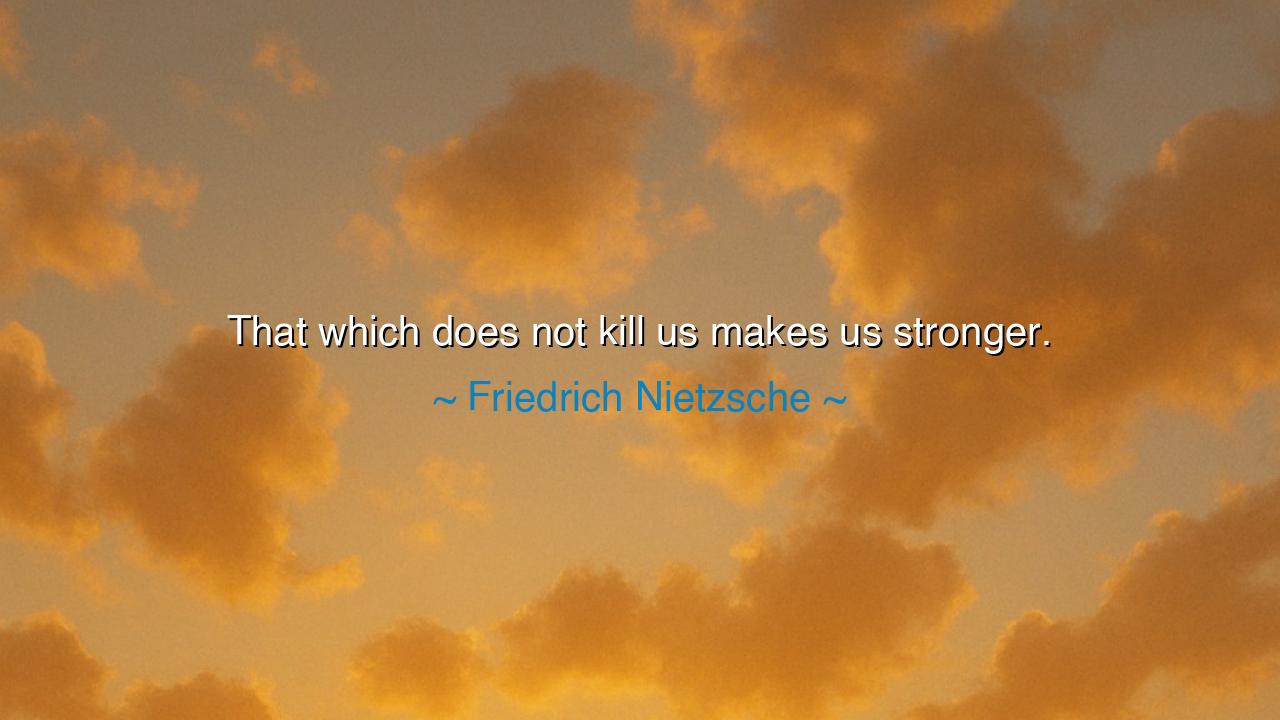
That which does not kill us makes us stronger.






Friedrich Nietzsche, the storm-tossed philosopher of fire and paradox, once declared: “That which does not kill us makes us stronger.” These words, born from a man who himself endured sickness, exile, and despair, are not the idle musings of comfort, but the fierce wisdom of survival. He saw that suffering, though cruel, is not merely destruction—it is also transformation. Pain can wither the faint-hearted, yet it can also refine the soul, purifying it into something unbreakable. The fires that scorch the weak may forge the stronger into steel.
The ancients knew this law well. In Sparta, boys were tested by hunger, cold, and hardship, not to destroy them, but to awaken within them a courage that no enemy could shatter. The Stoics of Rome declared that adversity is the training ground of virtue, and that without hardship, the soul remains flabby and weak. Even the myths spoke of heroes who gained power not from ease, but from trial: Hercules grew mighty by enduring his twelve labors, and Odysseus found wisdom through years of wandering. Nietzsche’s words, though modern in tongue, echo the eternal belief that endurance transforms.
Consider the story of Helen Keller. Struck deaf and blind as a child, she was thrust into a world of silence and darkness. Such a fate might have crushed any ordinary spirit. Yet through the relentless guidance of her teacher Anne Sullivan and through her own unyielding will, she learned to read, write, and speak. She became a writer, an activist, and a symbol of human resilience. Her trials did not kill her; instead, they made her stronger, shaping her into one whose voice still echoes across generations.
Nietzsche himself embodied this paradox. Sickly for much of his life, often bedridden and tormented by isolation, he still penned words that burned with vitality and defiance. His body weakened, but his spirit sharpened. He understood firsthand that suffering, though bitter, could deepen strength. His declaration was not a denial of pain, but a recognition of its secret gift: that endurance in the face of hardship builds fortitude that cannot be gained in any other way.
The meaning of his words is clear: trials are not merely enemies—they are also teachers. When we endure hardship, we develop resilience. When we face failure, we learn humility. When we suffer loss, we discover the depths of love and gratitude. Every struggle survived adds to our strength, until one day we look back and see that the storms that nearly broke us became the very winds that carried us forward.
The lesson for us is profound: do not curse every hardship, nor flee every trial. Instead, meet them with courage, knowing that each one carries within it the seed of your growth. Ask not, “Why me?” but rather, “What strength will this awaken in me?” Though the struggle may wound, if it does not destroy, it can empower. It can strip away illusions and awaken the deeper resources of the spirit.
Therefore, let each person practice endurance in hardship. When confronted with trial, breathe deeply and remember Nietzsche’s words. Hold fast to hope, even when the night seems endless. Train your heart to see beyond the suffering, to the strength that will be yours if you endure. Support others in their struggles as well, reminding them that their pain, though fierce, may yet become their source of power.
Thus Nietzsche’s words stand across the centuries like a battle cry: “That which does not kill us makes us stronger.” To live by them is to turn every wound into wisdom, every loss into resolve, every failure into a new beginning. It is to walk the path of the hero—not spared from struggle, but transformed by it into one whose spirit cannot be broken.






AAdministratorAdministrator
Welcome, honored guests. Please leave a comment, we will respond soon